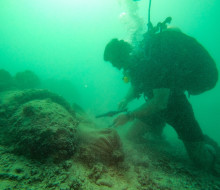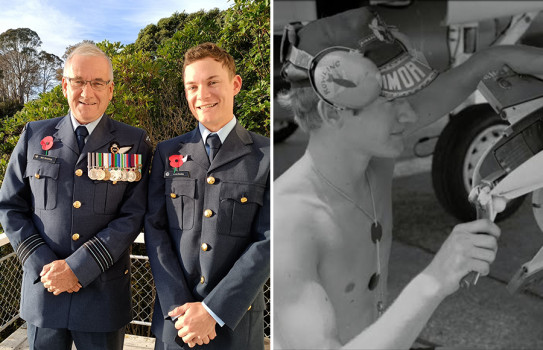
Second World War-era bombs in Vanuatu made safe by Navy divers
26 June 2024
Unfortunately you are viewing this website on an outdated browser which does not support the necessary features for us to provide an adequate experience. Please switch to a modern browser such as latest version of Google Chrome, Mozilla Firefox, Apple Safari or Microsoft Edge.
Ngā mihi nui
Wing Commander Bill Rowling is someone you want to have on your team in an emergency.
With 43 years of service in the Royal New Zealand Air Force (RNZAF) and a second career in emergency management, he is one of the many former New Zealand Defence Force uniformed and civilian staff who volunteer their time to support local communities.
Wing Commander Rowling is in the RNZAF Active Reserves, sharing his time and expertise between RNZAF Base Woodbourne and the Marlborough Civil Defence Emergency Management Team.
When the Interislander ferry Aratere grounded in June, Wing Commander Rowling jumped into action as operational planner for the Marlborough Civil Defence and Emergency Management incident management team.
“From an operational planning perspective, the event was relatively straightforward. The priorities were the preservation of life, protection of infrastructure - the ship, and protection of the environment including marine and land-based wildlife."
“Where the complexity of this operation came in was the tactical execution of the plan, which required several specialist agencies providing expert advice and action.Wing Commander Rowling moved into emergency management as part of his planned transition to civilian life after service, which started in 2013 when he started training for emergency responses.
Over the next several years, he built on his training through positions with the New Zealand Coastguard and at Auckland and Ohakea air force bases.

Wing Commander Rowling with his son James who is an Aircraftman in the RNZAF (left) and Wing Commander Rowling, then holding the aircraftman rank, prepares a Sidewinder missile launcher on an A4-K Skyhawk in Singapore in 1980 (right).
At Ohakea he was controller for the response to two live aircraft incidents.
“While we got through the response with no serious injuries or fatalities, both incidents were not textbook examples of emergency management. They highlighted the difference between slow-time scripted training exercises to fast-paced dynamic events.”
Wing Commander Rowling was based in Marlborough in the early 1980s but spent most of his RNZAF career with the P-3 Orion and the Airborne Surveillance and Response Force as an armourer, air ordnanceman, air electronics operator and air warfare officer.
He took part in numerous search and rescues, maritime and border resource protection operations, and military air operations. He also served on one deployment to East Timor and three to the Middle East.
He moved to Blenheim in 2022 and has since updated RNZAF Base Woodbourne’s standing orders for incident management.
“The difference between Woodbourne and its sister bases, Auckland and Ohakea, is that by virtue of its smaller size in a smaller region, the base is more connected to the community and faces different challenges.
“Base Woodbourne is often called on to support community responses to the prevalent floods and fires throughout Marlborough, Tasman and West Coast civil defence regions.”
Wing Commander Rowling is now focusing on passing on his experience to others.
“My biggest takeaways for an emergency are that communication and situational awareness are key to any response; ensuring information is being passed to the right people at the right time – just like any military operation."
“Recovery is also often overlooked as an incident response winds down and we shift our focus to the next crocodile closest to the boat. Each phase – risk reduction, readiness, response and recovery - holds equal importance to any event.”
Wing Commander Rowling said people should have a plan for individuals and their whānau to be self-reliant for a period of three to seven days in case main supply lines or utilities are cut off.
“These plans should include individual grab bags, contact lists, reserves of food, water and medication, lighting and cooking methods.”